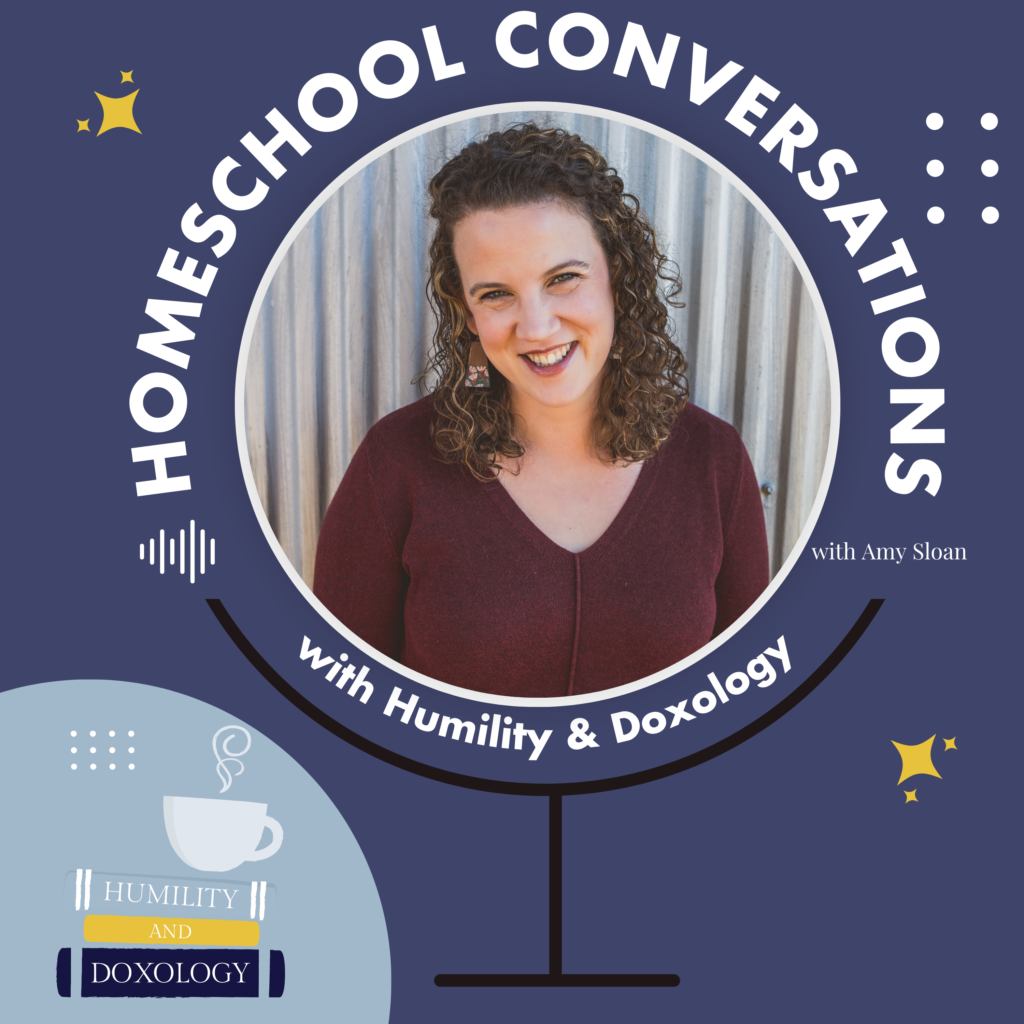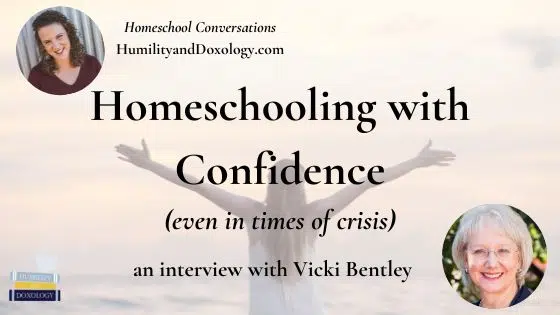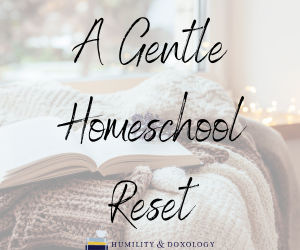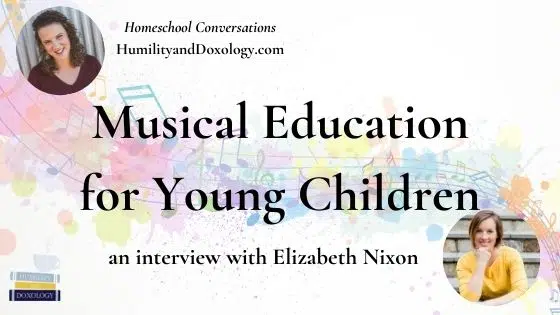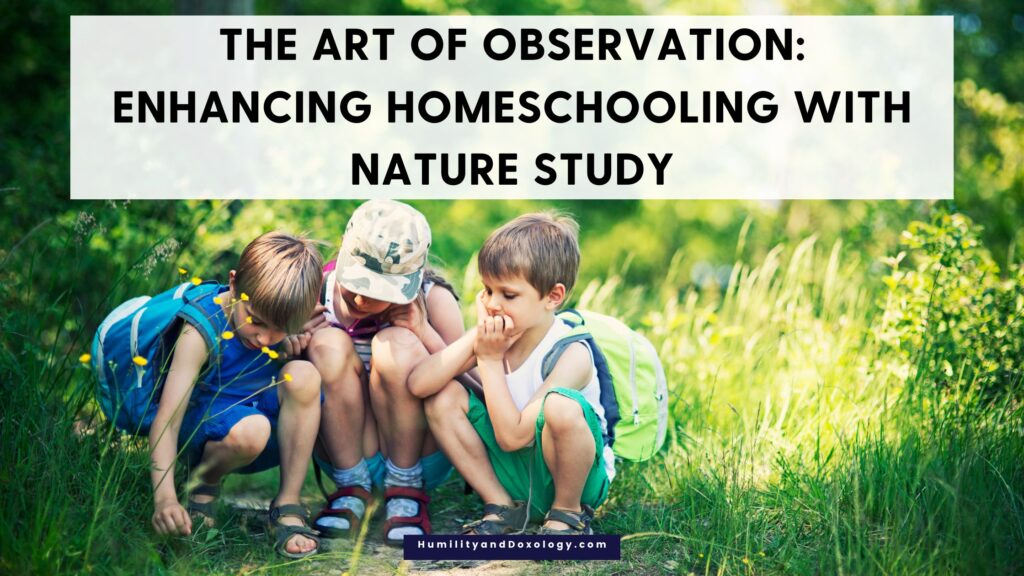It can be hard to homeschool with confidence in the best of times. But what about when life blindsides your homeschool? Job loss, moves, death, and illness (not to mention the blessed, but still disruptive, realities of new babies) can throw a wrench into our carefully laid homeschooling plans. Vicki Bentley joins us in today’s episode with practical tips and advice arising from decades of homeschool experience. Whether you’re facing out-of-the-ordinary challenges this school year, homeschooling when mom is sick, or tackling the more mundane struggles of every day life, you’re sure to come away encouraged and equipped for the homeschool year!
Be sure to check out all the other interviews in our Homeschool Conversations series!
Watch the video. Listen to the podcast. Read the show notes. Share with your friends!


{This post contains paid links. Please see disclaimer.}
Who is Vicki Bentley?
Vicki Bentley is the mother of eight daughters, foster mom of over fifty, and grandma to 23 wonderful grandbabies and six greatgrandbabies (so far). Vicki has homeschooled 17 children since 1988, alongside her husband Jim, and has been a support group leader since 1991. She has served on the executive board and convention committee of the Home Educators Association of Virginia and has addressed state and national conventions, university teacher organizations, and many mothers’ groups. She is the author of My Homeschool Planner, Everyday Cooking, The Everyday Family Chore System, Home Education 101: A Mentoring Program for New Homeschoolers, High School 101: Blueprint for Success, and other homeschool and homemaking helps. She currently serves as a consultant for HSLDA. Vicki has a heart for parents, with practical wisdom and encouraging words.
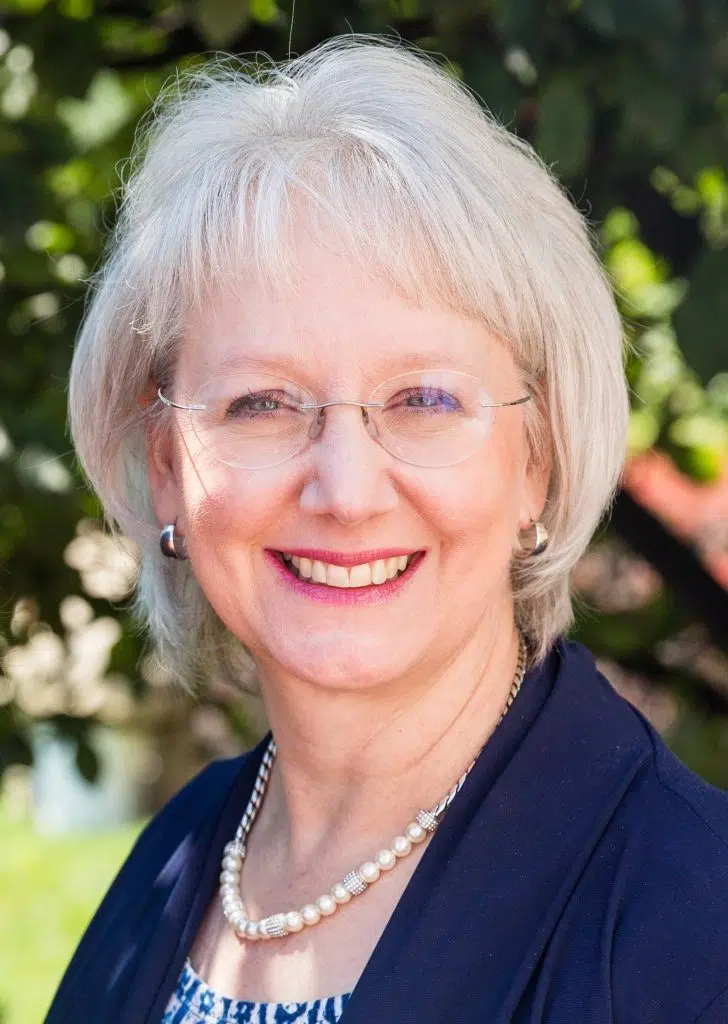
- Who is Vicki Bentley?
- Watch my Homeschool Conversation with Vicki Bentley
- Growth over years of homeschooling
- A few surprises on the homeschool journey
- Homeschooling in the Midst of Crisis
- What homeschool subjects should we prioritize in the midst of hard times?
- Self-Care for the Homeschool Mom
- Vicki's advice for a new homeschool mom
- What Vicki is reading lately
- Vicki's best tips for helping the homeschool day run smoothly
- Find Vicki Bentley Online
- Check out all the other interviews in my Homeschool Conversations series!
Watch my Homeschool Conversation with Vicki Bentley
Prefer to listen to your content? Subscribe to Homeschool Conversations on Apple podcasts or wherever you get your podcasts so you don’t miss a single episode!
Amy Sloan: Hello friends. I am joined today by Vicki Bentley. Vicki is the mother of 8 daughters, foster mom of over 50, and grandma to 23 wonderful grandbabies and 7 great-grandbabies so far. Vicki has homeschooled 17 children since 1988, alongside her husband, Jim, and has been a support group leader since 1991. She has served on the executive board and convention committee of the Home Educators Association of Virginia and addressed state and national conventions, university teacher organizations, and many mothers groups.
She’s the author of My Homeschool Planner, Everyday Cooking, The Everyday Family Chores System, Home Education 101, High School 101, and other homeschool and homemaking helps. She currently serves as a consultant for HSLDA. Vicki has a heart for parents with practical wisdom and encouraging words and I’m really looking forward to our conversation today.
Vicki: I’m excited to be here today, Amy. Thanks for inviting me.
Amy: Here at the beginning, as I always do, please just tell us a little bit about your family, your children, how you got started homeschooling?
Vicki: I think you’ve covered a lot of the family part. As you mentioned, we have eight daughters, and all of them who have school-aged children are homeschooling, that’s been really fun. Several of my great-grandchildren are being homeschooled now. That’s always interesting as well. We started homeschooling back when our oldest birth daughter was I think I want to say in second grade.
She had a weird grade level thing going because she was advanced. I think it was second grade and I didn’t know anybody who homeschooled. I’d met a lady a couple of years earlier when Rachel was about three. I’d met a lady at one of our military posts who had an Abeka kindergarten workbook that she snuck underneath her stroller because it was all contraband back then, nobody sold to us.
We have so many things available now. You look online, you go to the exhibit halls and there’s so much material to choose from, but there wasn’t back then.
She was the only person I’d ever met who homeschooled and I think I found her material in the back of a Christian women’s magazine. It was a correspondence course you could buy to homeschool your kids. That’s what we did. About partway through that, I started second-guessing myself as many of us do. [laughs]
I didn’t have anybody to talk to you to find out what was typical? What was going on? I put her back in her conventional school for the rest of the year. That didn’t go as well as we would have liked. A few years later, we did end up pulling the kiddos. Actually, it wasn’t because of that that we ended up more permanently homeschooling later on. We have a daughter who was born with cerebral palsy and the Lord miraculously healed her when she was about two years old, but she had a little bit of catching up to do. We knew that when we put her into school.
We had her tested, because that was what everybody did: you put your kid, he did preschool and then kindergarten and then regular school. They said she was fine, but we just had some issues with her teacher wanting to do some labeling and not wanting to help her out and not recognizing where she was growing.
Meanwhile, I had a first-grader who was not being taught to read phonetically. She was just guessing at words, left and right. She went to school at 7:00 in the morning, got on the bus a little before 7:00, got home about 4:30 in the afternoon in first grade and then had homework. Then had stuff we were supposed to do with her.
I thought if I got to teach her this stuff all afternoon and she’s missing out on the fun times, and I’m having to unteach her stuff they’ve been teaching her, that means we’ll just do this at home. That’s how we got started.
Amy: I love to hear that story. In this podcast season, I’m talking to you and a couple of others of that first-generation homeschool parents, along with my mom, my mother-in-law, and many others. I think it’s so important for my generation and even the women coming after me, the new homeschool moms, to really hear those stories of those early days where you didn’t have dozens and hundreds even of homeschool options.
It was very much looked askance upon. You wouldn’t go to the grocery store with your kids during school hours, all these things. It’s important for us to understand where we’ve come from in homeschooling to be able to not only learn from those who have gone before us but also really appreciate all of the blessings of what we have now. Thank you for sharing your story.
Vicki: I don’t know if a lot of people realize it back in the earlier days of homeschooling, we didn’t let our kids outside between, 8:00 in the morning and 3:30 in the afternoon because we didn’t want to have to do with the neighbor questions and things like that. I have friends who did drills on what to do if a social worker came to the door, which window the kid should go out, which neighbors were safe.
I have friends who were jailed or threatened with jail for home-educating their kids. It’s really a very different world now, thankfully, due to the efforts of our organization, state organizations, and a lot of other people who have paved the way.
One thing I want to back up to for our new families, too, is when that box was material that I ordered from that correspondence course at the back of the Christian women’s magazine. When that box came, I sat in the middle of my kitchen floor and cried over this box of material because I was so overwhelmed and panicked that I had made the wrong choice.

Why did I think I could do this? What had come over me, all of those. Could I get a refund? The whole nine yards. I just want to encourage our listeners that if you’re just looking into this, you may second guess yourself and you’re normal. [laughs]
Amy: Even as a second-generation homeschooler, you think well, I graduated from homeschooling and I think this would be easy for me. No, I still have those days where I cry out to the Lord and I say, “I think I’m ruining everything. [laughs] Please, Lord, I need your help.” It’s actually probably a good thing because as soon as we start relying on ourselves, it leads to either pride or complete despair. Looking to Jesus certainly brings peace in those moments, whether you’re experienced or a total newbie, both of us need Jesus.
Vicki: Of course, you’re right.
Growth over years of homeschooling
Amy: Vicki, you started in the kitchen with this correspondence box which is so funny. Now we have online courses, but this is back where you’d send off for something to come actually in your mailbox.
Vicki: We actually wrote a check. We didn’t even use credit cards. [laughs]
Amy: Oh, my goodness.
You’re crying in the kitchen with this box and now looking back it’s so many years later where you persevered. I’m sure that your thoughts and approach to homeschooling, philosophy of home education has grown and developed over the years. How would you say that grew?
Starting with a “school at home” approach to homeschool
Vicki: Oh, that is so true to me. All any of us know to do is what we did. That’s our paradigm. You have the advantage of having been homeschooled, you have a little bit better idea of what it can look like, what some of the options are, but for those of us who have only ever experienced a conventional classroom, we just know to do what we did. We try to recreate school at home.
Whether it was back then with me or a lot of our families right now, that’s all we know. We try to recreate school at home. We started off really structured. We had the flag, we had the pledge of allegiance, we had the little desks, we had the whole nine yards. We started off fairly formal but we, as time went on, got a little bit more relaxed on how we did things.
Learning to relax in the homeschool
The first year, I just needed to feel that I had some handle on what we were doing but at the end of the year then I could evaluate and say, “I liked that homeschool language arts material but I think I could do something differently for this other subject.”
Or maybe we would get a little bit more relaxed in our approach to some things. Now, it’s important to point out that our standards didn’t change, our requirements for the skills we wanted our kids to have didn’t lower in any way, but how we accomplish those things often did. If I were to start again, now, I’d probably be even more open to a lot of the different options that are available. I’ve actually talked to my girls about this because as I mentioned, they’re all homeschooled. All the ones that have school-aged kids, and many of them homeschool very differently from each other but they dovetail together.
I’ve asked them how did our homeschooling experience influence yours? They have mentioned that they were thankful, they were able to jump in further ahead on that learning curve than I did. They were able to avoid some of what didn’t work well for them as kids and find what works for their children. I’m glad that they think outside the box a little more than I was comfortable doing. That’s probably where I would start.
There’s a lot of materials that have come available since then. I look at a lot of, I don’t know if I’m allowed to mention, brand names here, but there’s a lot of materials that are available that give you some structure but aren’t necessarily let sit down with a book all day long. That I probably would have investigated for my kids. Let them explore their passions a little bit more earlier than I figured that out. Their learning styles, what worked well for them. Again, I just knew what worked in a conventional classroom. My kids weren’t all conventional classroom kiddos.
Amy: As a second-generation learner, I think the best gift that coming from homeschooling gave me is not so much that I homeschool the exact same way that I was homeschooled but I’ve never been inside a box, right? The idea of doing something different from other people doesn’t scare me, because I’ve always been a rebel, right? [chuckles] I never did it just like everybody else.
I think that’s a real gift of coming in on this site. I will mention here, I wrote a four-part series actually, as a guest post on The Curriculum Choice website about homeschool generations. I shared my own story, one of the articles actually interviewed half a dozen or more first-generation homeschool moms like my mom’s age. Another post, I actually interviewed a bunch of other second-generation homeschool moms, and just everyone getting to share their story. It was really a blessing to me. I think it’s valuable for homeschool moms now, too. I’ll put those links in the show notes. [laughs]
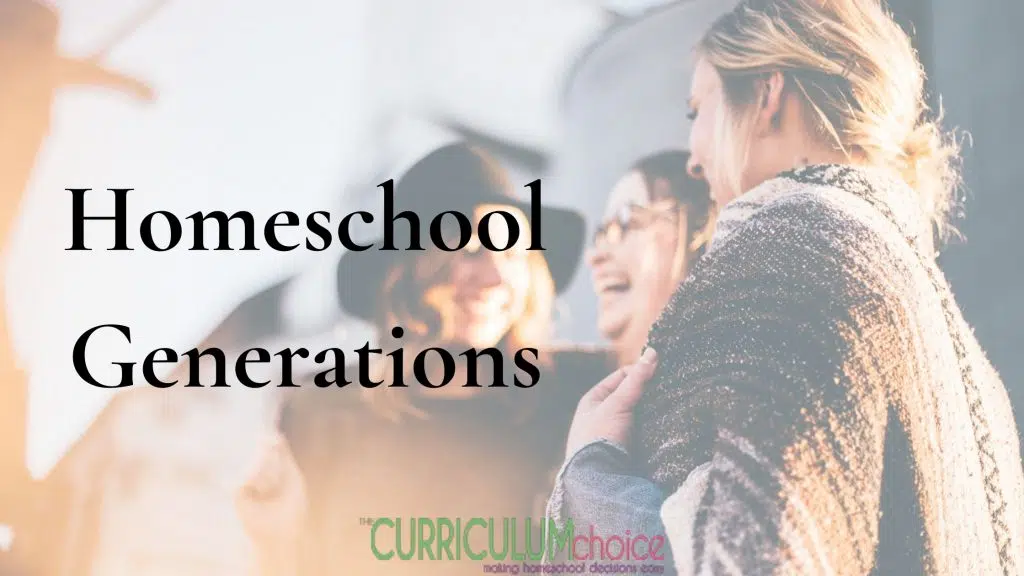
Vicki: Going back to that, Amy. I did ask one of my girls. I’ve asked probably all of them at some point but I remember one of them when I talked to her about her educational experience. What would you have done the same? What would you have done differently? How did you feel it went? Now that she’s– because my youngest child is 32 years old. My oldest is 52.
My youngest is 32. We’re a little bit farther along the continuum there. She said, “I knew I got a good education. I never doubted that. What was more important to me wasn’t what I learned, but that I learned to learn. The best gift you gave me was teaching me how to learn because now I can learn anything.”
Amy: My kids know if mom wants to know something, she comes back from the library with a stack of books.
A few surprises on the homeschool journey
We’ve talked a little bit about, this sort of perspective that you have looking back on your years of homeschooling. I would love to know if there was anything in particular that surprised you about homeschooling? Maybe positive or may be negative, or maybe both?
Vicki: Like I said before, I was terrified getting started. I didn’t have a bunch of people to rely on. That’s why I’ve written some articles on the topic of connecting with other people you can find on my website.
What you mentioned you did with your first-generation and second-generation friends reminds me of a book. A friend of mine put together a book back in the day called See, I Told Me So!. Tammy Cardwell edited this book, and it was a bunch of articles by women who had finished the homeschooling journey.
She also included a couple of grads who had finished the homeschooling journey. It was about how, when we get started, we second guess ourselves, [chuckles] we started thinking everything’s great for about three days. Then we spent two years second-guessing ourselves. Then we spend the next few years wondering if we’re doing this right.
In her book, the whole point of this was, once your kids are all done, you can look back and say, “See, I told me so, it turned out okay.” [laughs] I took a poll once I was doing a game for a workshop, and it was one of those Family Feud types of games we were playing.
I surveyed 100 homeschool families. I asked them, one of the questions was, what is your main concern your main fear as a homeschooling parent? The number one fear, whether it was a newer homeschool or veteran homeschooler, finished homeschooler, was that they weren’t doing enough for their kids. They weren’t going to do a good enough job. They weren’t going to equip them well enough.
What I see looking back from my vantage point now was that even when I thought stuff wasn’t sticking, it really was. They were learning, even if they didn’t think they wanted to be learning. [chuckles] Interestingly enough to me, even my child who was the most adamantly opposed to being homeschooled now, homeschools her kids. [laughs] Your kids are watching you, your kids are listening, and what you’re doing matters. That was important for me to see coming through the other end.
Amy: That’s a good reminder, and probably an encouragement I particularly needed today. Sometimes even as a homeschool blogger podcaster lady, you’re coming in recording a hard homeschool day and you’re like, “Homeschooling, yay.” It is that, right, in that big picture. Sometimes when you’re coming to record, you’ve maybe had a bit of a harder day. It’s always a blessing to me to hear the encouragement straight from my guests. I appreciate that.
Homeschooling in the Midst of Crisis
I wanted to pivot a little bit and talk about a little bit of a more serious topic here. Because a lot of times we start out the homeschool year strong, we have these great ideas. These plans, we have this vision of all that we’re going to teach at this wonderful thing for our family. Then life happens. Maybe it’s a move or a new maybe. Or it could be something more traumatic, like a job loss or death in the family, or a serious chronic illness.
We still have to homeschool in the midst of this. That’s really, really hard. I wanted to give some resources and ideas for people, how can we find a way to focus on what’s most essential in our homeschool and those challenging seasons, especially if it’s a time of crisis?
Vicki: Sure. I actually have an article I do a workshop called When Life Broadsides Your Homeschool, and we talk about some of these I call them specific train wrecks. Things as you’ve mentioned, a death, an illness, a job loss, it could be not a job loss, but a job. We got a lot of moms going back to work at this point. That derails their homeschooling, you could be bringing an elderly family member home to live with you where it’s going to be a little bit longer-term type of thing.
In my workshop, I do go through some specifics of, in this particular case, here are some things you might try. There are some things that are general, more relevant to all of those train wrecks if you want to call it that. I’d just like to outline those for you if you have a minute?
Amy: Yes, please.
Redefine Normal and Have a Plan
Vicki: The first thing I found is that whenever these things happen, we tend to put everything else on hold. We think when life gets back to normal, then everything will be okay. The fact is, in many cases, life is not going to look like it looked before. You have to redefine normal, you have to find a new normal. That’s what we look at is, how do we redefine normal?
It really starts with not even homeschooling stuff. It starts with life.
I always recommend as you’re trying to redefine normal, you’re finding your new normal, you want to get into some kind of rhythm, or pattern, or routine. I’m not talking about a schedule where you ding the bell and go from thing to thing. Think about in all the chaos that may be going on in your life right now what is getting dropped, that really shouldn’t be getting dropped. Maybe it’s meals, maybe it’s basic homekeeping.
You want to keep some semblance of order. I’m not talking your house’s photograph or magazine. I’m talking, you’re not worried about somebody calling from the neighborhood or something. Maybe it’s bedtime. Those basic life things, kids find security in a routine.
As parents I know, for me, I find an emotional relief in not having to think about every decision of my life. If I can put as much of my day on autopilot as possible, I do a whole different workshop on time management. If I can put as much of my day on autopilot as possible, then I have some brain power left for the decisions that I have to make related to whatever crisis is going on in my life. I don’t want to have to make a one-word decision.
Another thing that was helpful for me in putting together some rhythm to my day, was having some plan to stay on top of the house. There’s a little meme that was going around the internet once it said something like, “Cleaning your house while your kids are home is like brushing your teeth while you’re still eating Oreos.”
This is not going to happen. It’s not like when they weren’t you put them on the bus and you could clean up the house in 45 minutes. Then you could relax in it all day until they trashed it at three o’clock. They’re just trashing it right behind you all the time. I had to come up with a plan to stay on top of my home. That’s why I developed, I have a book called The Everyday Family Chore System. I have some articles on my website, How To Get Your Kids To Help At Home, to help people have an idea of how to include our kids. We tend to feel that we are abdicating our responsibilities if we make our kids do chores.
It makes them feel needed and wanted. No, I’m not saying slave labor here. I’m just saying, if your child had two or three chores in the morning, they empty the dishwasher or they sweep the stairs. Or somebody cleans off the breakfast dishes and loads the dishwasher, whatever that might be. It doesn’t have to be big things but they’re not painting the house necessarily or something but by having some responsibilities, they feel part of the house. For me I needed it to be a system because if I had to think every day who’s going to do this. If it was, we couldn’t work one of those pull the thing out of the jar things.
I had to know in advance we had a plan. You can see more about that on the site. That really helped me. After a while, my kids got into the rhythm of this is what we do. They balked at first. All kids do, “I don’t want to have to do this.” Unless you’ve got a two-year-old. They always want to help. The two and three-year-olds always want to do everything. Once they get a little older, maybe not so much.
Have a plan to stay on top of your house because people don’t quit homeschooling because they can’t find the right math book or the right language arts program.
Usually, if they’re going to quit homeschooling, it’s because they’re trying to do math and language and social studies and science. The laundry is up to here and Dad is eating Frosted Flakes for the third night in a row from a bowl he had to wash himself after he made a pass to the kitchen. You know how that works.
My goal is to help moms in particular stay as much on top of everyday living as possible so they feel like they have hope for another day of math and language and social studies.
Because otherwise, they feel like something’s got to go, and generally, it’s going to be homeschooling. That’s that. Another thing when you’ve got all of those things bombarding you,– Oh, and by the way, I know I talk fast, if you want to jump in or ask a question, please feel free. [laughs]
Amy: Oh, no. I love it, I love it. I just am loving all these ideas. Keep going.
How do we get our homeschool back on track?
Vicki: I get passionate about this, because this is my heart. These are the moms I talk to every day in my job. These are the parents who call in, and they’re so overwhelmed. “Where do I start to get back on track?” One of the things academically is usually when all this is going on, people call me and say, “I have this great plan at the beginning of the year, but now it’s February and we’re still on three. What do I do? Do I start over again? Do I pick up where we were? I don’t know what to do.”
I like to think of it this way. Your curriculum is your roadmap. Actually, the word means course. It’s your course. It’s your roadmap. It’s your GPS. When people call me at work and they ask me for curriculum suggestions, it’s like asking me for directions on their homeschool journey. Now, I am very, very geographically [laughs] challenged to a fault. It would not be uncommon for me to call say, you and say, “Amy, I’m so lost. I need directions.”
You’d probably want to know two things. Where are you and where are you trying to go? It’s the same thing with homeschooling. Whether you’re starting fresh as a homeschooler or you’re in crisis mode right now, the question is the same. Where are you right now and where do you want to be? Now, one time when I was coming home from Pennsylvania to Virginia, driven around a bazillion times. I ended up missing something. I called my husband, collect before cell phones and I said, “If I’m on Skyline Drive, did I miss a turn?” He said, “Yes,” and he went, got a map.
He didn’t send me all the way back to where I started from to start over. He looked at, “This is where you started. This is where you accidentally are now. Let’s see what’s the best route to get you where you want it to go?” It’s the same thing for you now, parents who may be listening in these circumstances.
You don’t have to start over. Let’s look at where you are right now, and we have tools to help you assess that. Where is reasonable to be by the end of the year? Now, what detour do you need to take? How do we need to reroute you to get you where you need to be?
It’s okay. It’s not a race. It’s not a competition. You’re just doing the next thing. Remember, math and language arts are the skills subjects. Science and social studies aren’t skills, they’re content. If you feel like, “Oh gosh, we haven’t done science and social studies all year.” I’m not saying that’s the best way to live, but if that happened to you, it’s okay. Don’t panic over science and social studies.
Just look at those skill subjects of math and language arts and see how you can get closer to where you would want to be. The fact is, you just can’t change what’s happened. Whatever has happened this year has happened.
Start where you are, ask God to help you be a joyful mother of children because that’s really the most important thing, is just to have joy in this journey. Pray for grace. Pray for wisdom in these choices you have to make now and move forward. That’s all of it in a nutshell. [laughs]
Amy: That’s so encouraging. A few seasons ago, I interviewed Cindy Rollins, another veteran homeschool mom, and she said that one of the most important things in homeschooling is for children to see the joy of their mother towards them. I thought that was such a good reminder, because how often can we get in these? Whether we’re in crisis or not, we’re just like, “Okay, here’s what we’ve got to do today and the next thing and the next thing, and why have you done this thing? Or we’re behind and go, go, go.”

Just remembering, we need to stop and make sure we look at those precious children that God has given to us for a time and smile at them. Take that moment to smile at them and make sure they know that we are so overwhelmed with joy. [laughs] It may not feel like it every moment, but we’re really glad to be their mom. This is a gift that we have this opportunity to be with them at home. It really is not something to take for granted.
Vicki: That is so important. I’m so glad you mentioned that. I have a workshop I do on “Jumpstart to Joyful Motherhood”. Actually, it may be on the site as well. I spent a lot of my earlier homeschool years not recognizing that. Feeling that I needed to be checking off the boxes, moving forward, where are we behind? Behind what? Really? When it comes down to, what am I worried about being behind?
The Lord had to show me some things in my life that I needed to work on to be more joyful. I wanted my kids to know I picked this. I chose to do it. Now, I know that some of you listening may not be in that circumstance. My heart goes out to you. I know we have a lot of homeschoolers right now who are making a choice based on circumstances, not necessarily their life choice originally. I wanted my kids to know that I loved being with them.
There were some things I needed to do in my life and in my habits that could convey that to them better than I had been. When it was all said and done, I did want them to be 18 and think, “Thank goodness I’m out of here.”
When they look back on homeschooling, I wanted them to remember that we had joy as a family.
Amy: There’s one practical tip. Everyone pause the podcast right now, go find your kid, look at them in the eye and tell them you are so glad that you get to be home with them. [laughs] That’s a good thing to do any time. We’ve talked about in a time of crisis, just prioritizing really the environment. Making sure that we have some plan for those basic family necessities, eating, having our clean laundry, because a lot of times when that is crazy, it makes the homeschooling feel completely overwhelming.
What homeschool subjects should we prioritize in the midst of hard times?
You mentioned academically prioritizing those skill subjects like math and language arts. Is there anything else with education? Somebody just has a crisis, what would be those things? Anything else other than math or language arts you’d say to really prioritize?
Vicki: It’s also important to realize it’s okay to change up what you’re doing. Sometimes we go into this and think, “Oh, this is the best way to do this, and I hope I never have to do X, Y, Z approach.” Sometimes life happens and you just need to do something different. For the mom who’s been doing all of the unit studies and putting things together herself and doing all the adventures, right now may be the time you do an online class.
Because it’s simpler for you, easier if you can swing it for a little while. Or it may be the time to bring in a tutor or to do something a little different. It doesn’t mean you have to do that forever if it’s not what you had envisioned, but it’s okay to change things up. There’s not a right or wrong way to do this.
Amy: I like to say that the imperfect thing that we actually do is better than the perfect thing we never start.
Vicki: Exactly.
Amy: Sometimes we have this crazy, perfect ideal in our head that becomes our enemy because we don’t even know how to start that. Do the imperfect thing and do it consistently and that will serve you well.
Vicki: Definitely.

Self-Care for the Homeschool Mom
Amy: Again going off on this idea, what about as far as family schedule or even just mom prioritizing our physical, emotional, and spiritual well-being? How can we find the space for that while we’re also trying to homeschool and deal with the challenges of life?
Vicki: I’m not sure if I’m the best person to answer that. My husband is listening to me answer this so I got to be really honest here. [laughs] I wasn’t always really good at prioritizing me. That’s a really tough– it’s a tough balance there because as Christian moms we’re all about sacrificing for our kids and doing what God wants us to do and all those things. We don’t want to feel that we’re being narcissistic or self-centered or whatever, but the fact is, if I’m not taking care of me, I can’t take care of my kids.
It doesn’t mean I’m going to run off to the mall every day or something, but it does mean that maybe I take 15 minutes during the middle of the day to go have some quiet time or listen to some music or do some artwork if I want to or color painting. Whatever it is that makes you feel relaxed. It isn’t necessarily doing something away from my kids. It could be finding something that I enjoy doing with my kids that brings me peace, gives me some breathing space.
The key to all of this is building in some margin.
When I first started homeschooling, the first year I homeschooled, like I said, I didn’t have anybody to tell me the ropes here. You couldn’t buy a lesson plan book for homeschoolers. You just had to go down to the teacher’s supply store. I’m sorry, there’s something beeping here. I don’t know how to make it go away.
Amy: That’s okay.
Vicki: I went down to the teacher’s supply store and I got the little four year-30 kids in your class lesson plan book. I lesson planned my whole 180 days at the beginning of the year in it because it looked better and didn’t smear. Boy, that was a mistake because, on about day three, somebody doesn’t get the math lesson in. Then you spend 177 days feeling like you’re behind. Anyway, I scheduled everything down to the NTHS degree and what I realized was I needed to build in some downtime.
The first thing I did was re-evaluate our overall schedule for the year. I had been using it every day, the same one that everybody in our neighborhood used and I was burning out really fast. [laughs] At some point, I was homeschooling 7 or 8 kids at a time. I determined that I could do anything for 8 weeks at a time if I knew I got a week off. The first thing I did was for this work for us, not saying everybody needs to do this but I re-evaluated my year.
I set it up in five eight-week blocks with a week off in between. I took four weeks off at Christmas and four weeks off in July but the rest of the year it was eight weeks on one week off, which gave me 40 weeks, which is more than my state’s school year. That gave me some wiggle room. The other thing I did was in those eight-week blocks, I built in some half days off of regular schoolwork, for me. Still had educational, fun things that kids could do if they wanted to but life is going to happen.
Somebody’s going to get sick. The dishwashers going to break. You’re going to have to take the car in for an oil change. All of these different things are going to happen because it’s real life. If I’ve scheduled my day down to every minute, every day and those things happen, I have no breathing space. I have no margin. I have no let’s just trade this for another thing type of approach.
If I’ve built some time off into it, it’s a teacher workday. Parent-teacher conference, if you want to call it, [laughs] then talk to yourself for half a day. It could be, whatever you want to call it, teacher sanity day. They do that in the school systems all the time. I built those in and that way I didn’t have to feel guilty when I took time off because it was planned.
Amy: In my free homeschool planning guide, I talk about when we think about our money budget, we would never allocate every single penny of our budget because we know the car is going to break. The dishwasher’s going to break, something’s going to go wrong. You’re going to need a little bit of a buffer in your budget to be able to take care of those unexpected situations.
Somehow with our time, we forget that we are going to need to budget our time, that way too. We list out all the things we want to do and don’t actually calculate if we have enough time to do them? It would be like saying, “I want to go on a vacation to Hawaii this year without actually seeing if we have the money to pay for it.” It’s good to think about time as that finite resource too, budget your time.
Don’t try to fit more in than is physically possible. Accept the limits of being a finite creature and then give yourself some white space so that when the diaper blowout happens or the toddler has a tantrum or these things that happen or the teenager needs you to sit and talk with them about some huge, important issue of the day. You have that space in your schedule and you’re not constantly feeling behind and stressed out.
Vicki: Something that helped me with that was instead of having little nitpicky lesson plans for every little detail to do some things in blocks. Some people might say, for example after breakfast, we’re going to do seat work or some people might call it table work or whatever. Where you sit down and you know all of the things that you would need to do your math, your language arts, those things would be done there.
You’re not necessarily saying from 10:00 to 10:15, we’re doing such and such, but you have a block of time. That’s set aside. You have a framework, you have a routine, and you have a pattern but what happens during that pattern can be changeable, can be flexible. That way when life happens, you just know that the next day you have a real day, you just do the next thing.
Vicki’s advice for a new homeschool mom
Amy: Do the next thing I think is the most powerful homeschool planning tool [laughs] really is. One of the questions I love asking veteran homeschool moms especially is if they were talking to a new homeschool mom, which I know you do regularly as part of your work. When you’re speaking to a new homeschool mom, what piece of advice or encouragement would you offer her?
Vicki: Golly. I guess the first thing is to remember that you homeschooled them for the first five years already. Anyway, in your experience doing this you just don’t realize it. If nobody told you that when your child turned five years old for six or whatever in your state, most of us think of five. When your child turned five, he had to go to school. What would you be doing with him because you were already homeschooling?
How can you take what you were doing that worked well for your family in those earlier years and be more intentional, more purposeful with it? My goal when I talk to families whether their kids are younger, older, or whatever is, I want to help you figure out who you are as a family. What is your family dynamic? Are you an outdoorsy family? Are you a let’s sit down and read books family? Are you a sports family?
What works best for you? A nature walking family, a camping family? Who are you and how can we take a homeschooling approach and fit it into who you are not the other way around? It helps when you’re doing all of this to understand your– to kind of define for yourself your why are we homeschooling? If you could sit down and make yourself a little couple sentences of why we are choosing to homeschool? That will help you make those choices of what and how, because then as you go along you can just keep going back to your, is this helping us to accomplish our, why?
What do we need to change? Why am I doing– some days you just need a reminder, why am I doing this? Understanding why you’re doing things, first of all, help you choose your material, help you choose your approach, and help you not stress out quite so much in the day because you know what? We were doing this to accomplish X, Y, Z, and we’re doing that.
The rest of this is okay. The other reason it’s helpful is there may just be some days that you just need to be reminded why you’re doing this. [laughs] You throw in you’re going to have tough days, I guess really the bottom line is you can do this. If I could tell you anything, it’ll be, you can do this, but here are some things that can help you not feel overwhelmed.
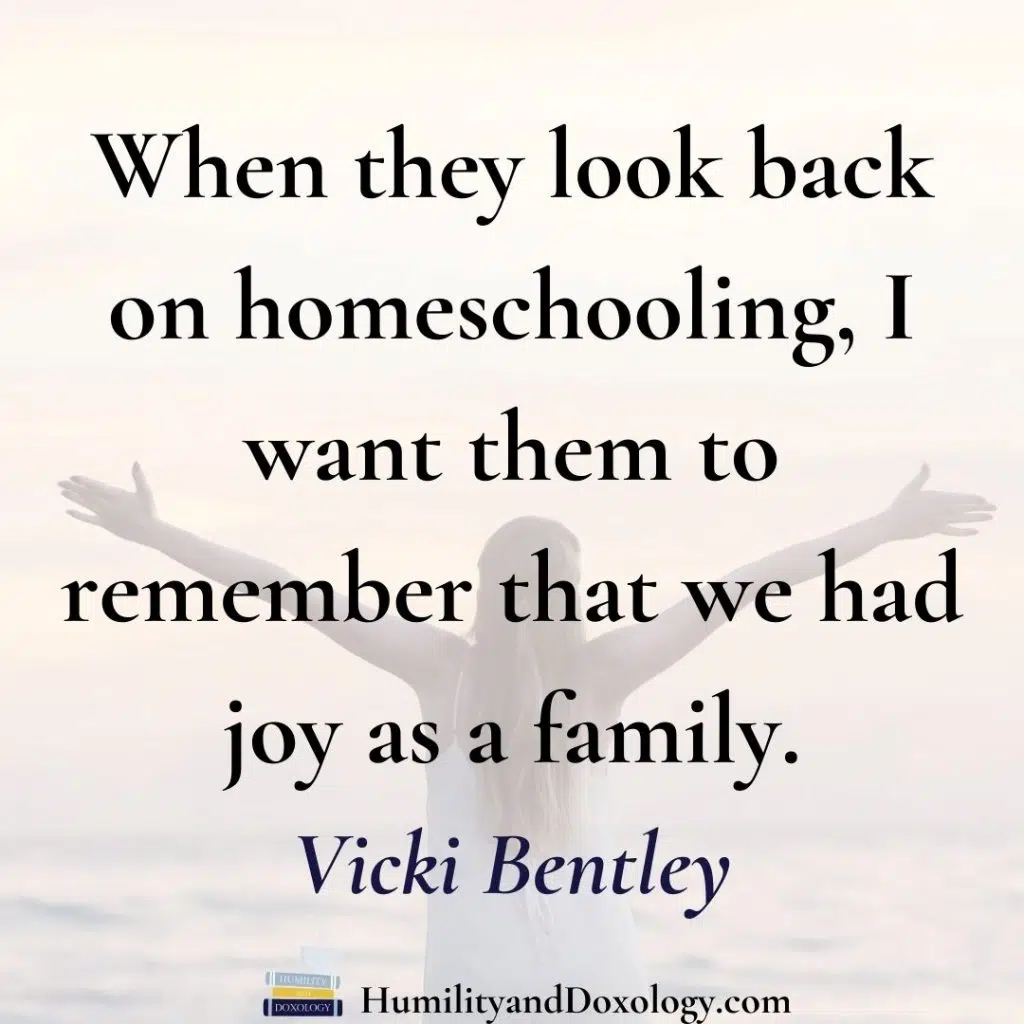
What Vicki is reading lately
Amy: I love that. I know that will be an encouragement to the moms listening now. Vicki, here at the end, I’m going to ask you the questions that I ask all of my guests and the first one is just, what are you personally reading lately?
Vicki: Oh, let’s see. I never read one book at a time. I think my husband would probably say I have ADD but I usually have a bunch of books going at the same time. Right now I’m in the middle of Project-based Homeschooling. I’m reading One Minute Mentoring. I’m reading What Left Behind, Left Out About Modern Times. Those are a few things I’ve got going.
Vicki’s best tips for helping the homeschool day run smoothly
Amy: Those all sound like tantalizing titles. Then the final question is what would be your best tip for helping the homeschool day run smoothly?
Vicki: I think a lot of it goes back to the “why”. I wanted to share a couple of little thoughts with you that are all related to this. Just a reminder that we talked about earlier, learning is a lifelong continuum. It is not a race. It is not a competition when we ask ourselves, oh, what happens if we get behind? Get behind what? Like you said, just do the next thing.
The biggest tip I guess is just to have a plan.
It could just be a loose overview of what you want to accomplish this week or this month or this year, and then just pick some stuff that’s going to help you get there. Hold the plan loosely because life is going to happen again. We talked about building in some margin. There’s an artist from, I think the ’70s or ’80s, Bob Ross, some of you know him as the little trees guy but he once said things that just happen are sometimes more beautiful than things you really sit and plan. Which is really just another way of saying what Proverb says in Proverb 69. We can make our plans, but the Lord determines our steps.
I guess my main thing is you can only do what you can do. Just do your best, ask the Lord for grace and wisdom and understanding of what your child needs. We have a little saying in our house, the best you can do is the best you can do. If I’m doing my best, that’s all I can ask of myself. [laughs] You can do this.
Find Vicki Bentley Online
Amy: Thank you so much for those encouraging words and thank you for chatting with us today. Vicki, where can people find you all around the internet?
Vicki: I am an educational consultant with HSLDA. If you’re a member, you can call them and chat with me, I work with families from pre-school through eighth grade. You can find me on the internet at my site as well at homeschoolwithconfidence.com and everydayhomemaking.com.
Amy: Wonderful. I will have links to those things in the notes for this episode over at the show notes for this episode at HumilityandDoxology.com. Thank you so much and have a good rest of your day.
Vicki: Thanks, Amy.
Check out all the other interviews in my Homeschool Conversations series!
